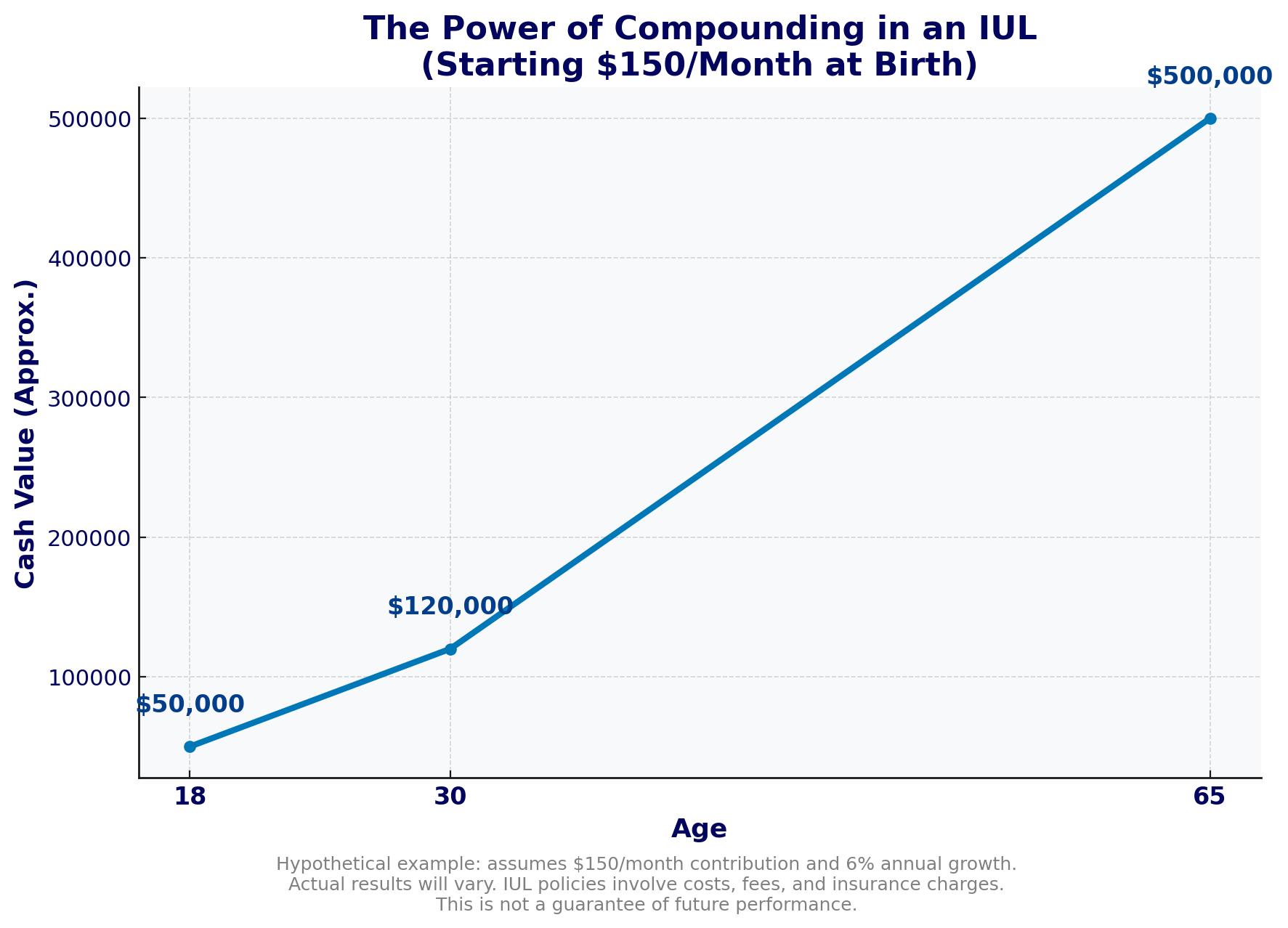Last Updated: September 4th, 2025
Secure Your Child’s Future: The Benefits of IULs and Cash-Value Life Insurance
As parents, we want to give our children the best possible future—one filled with opportunities, security, and financial freedom. While education savings accounts and traditional investments are helpful, there’s another powerful tool many families overlook: Indexed Universal Life Insurance (IUL) and other forms of cash-value life insurance.
This type of policy doesn’t just protect your child—it builds wealth over time, creates financial flexibility, and can even support them in major life milestones like college, buying a first home, or retirement.
In this blog, we will discuss the following topics:
What is Indexed Universal Life (IUL) Insurance?
When to Purchase IUL Insurance
Watch Video on IULs
Benefits of IUL Insurance for Children
Risks Associated with IUL Insurance
How much does an IUL cost on average?
Other Types of Cash-Value Life Insurance and 529 plans
How to Set Up an IUL for your (grand)child
Find out how much your child’s IUL would be with our Online Quoter
What is Indexed Universal Life (IUL) Insurance?
Indexed Universal Life (IUL) insurance is a type of cash-value life insurance that combines the benefits of traditional life insurance with potential for growth tied to the performance of specific market indexes. A portion of the premiums goes towards providing life insurance coverage, while the remainder is invested in indexed accounts, such as the S&P 500. As the market performs well, the policy’s cash value can grow, providing a potential source of funds for the policyholder.
An Indexed Universal Life (IUL) policy is a type of permanent life insurance that does two things at once:
-
Provides lifelong protection for your child with a death benefit.
-
Builds a cash value account that grows over time, linked to a market index (like the S&P 500®).
The cash value growth is not invested directly in the stock market. Instead, it tracks an index and earns interest based on its performance, with a cap on how much you can earn in a given year—but also with a floor of 0%, so your child’s cash value won’t lose money in a down market.
This makes IULs unique: they combine the protection of life insurance with the growth potential of an investment-style account, without the same market risk.
Over time, the cash value can be accessed through loans or withdrawals, often on a tax-advantaged basis when structured properly. Families often use this cash value for:
-
College tuition
-
A first home down payment
-
Starting a business
-
Supplementing retirement income
This dual purpose—protection plus growth—is what makes IULs an attractive tool for parents planning ahead for their child’s future.
The Hypothetical example below shows how an IUL could work:
- Parent: John and Mary are a young couple with a newborn son, James. They are concerned about providing for James’s financial future, so they decided to purchase an IUL policy for him.
- Policy: The policy has a death benefit of $100,000 and a cash value growth potential of up to 10%. John and Mary make regular premium payments, and the policy’s cash value grows steadily over time.
- Outcome: When James turns 18, he has a significant amount of cash value in his IUL policy. He uses the money to pay for college and has some money left over to start his own business.
When to Purchase IUL Insurance?
Indexed universal life (IUL) insurance can be a good option for parents who want to provide financial security for their children.
Here are some of the people who may benefit from purchasing an IUL for their child:
- Parents who want to provide a death benefit for their child. IUL insurance provides a death benefit, which can help to provide financial support for your child’s family if they die prematurely.
- Parents who want to help their child save for college. The cash value of an IUL can be used to pay for college expenses, and the policy can also be used to provide tax-free withdrawals for qualified education expenses.
- Parents who want to help their child build long-term wealth. The cash value of an IUL can grow over time, and it can be used to provide retirement income or other financial goals.
The best time to purchase IUL insurance for your child is as early as possible. Starting early allows for more time to accumulate cash value, maximizing the benefits over the policy’s lifetime. Additionally, young applicants often qualify for lower premiums, making it a cost-effective solution for securing their financial future.
There are many factors to consider when deciding when to purchase IUL insurance for your child, but generally speaking, the earlier the better. Here are some of the reasons why:
- The younger your child is, the lower the premiums will be. This is because younger children are less likely to die, so the insurance company is less likely to have to pay out a death benefit.
- The longer your child has for the cash value of the policy to grow, the more it will be worth. This is because the cash value of an IUL is invested in the stock market, so it has the potential to grow over time.
- If your child has a chronic health condition or other risk factors, it may be more challenging to get them insured later in life. By purchasing an IUL policy when your child is young and healthy, you can lock in more favorable rates.
When not to purchase an IUL
- You cannot afford the premiums. IUL premiums can be expensive, so it may not be the right option for you if you cannot afford to pay them.
- Your child is not a good candidate for life insurance. If your child has a chronic health condition or other risk factors, an IUL may not be the right option.
- You do not need the death benefit. If you do not need the death benefit of an IUL, there may be other financial products that are a better fit for your child’s needs.
Talking to a financial advisor to see if an IUL is right for your child’s specific situation is important. They can help you assess your child’s needs and goals and choose the right financial product for them.
Here are some additional factors to consider when deciding if an IUL is right for your child:
- Your child’s financial goals. What are your child’s financial goals? Do they want to use the cash value of the policy to pay for college, start a business, or retire early?
- Your child’s age. The younger your child is, the longer they have for the cash value of the policy to grow. However, younger children also tend to have lower premiums.
A Real-Life Example: How Compounding Works in an IUL
Imagine setting aside $150 per month into an IUL when your child is born. By the time they reach:
-
Age 18: A significant balance available for education or other early needs.
-
Age 30: Cash value has grown further, available for a home down payment or launching a business.
-
Age 65: A six-figure, tax-advantaged retirement supplement.
That’s the power of starting early, compounding growth, and market-linked returns with downside protection.

Why the 0% Floor Matters
Markets go up and down. But with an IUL, your child’s cash value won’t go negative in a downturn. While they may miss some upside caps, they’ll never see their account wiped out in a bear market.
Your Child’s Cash Value Will Never Go Below 0% in a Down Market
Benefits of IUL Insurance for Children
-
Long-Term Financial Security: An IUL policy for your child acts as a financial safety net, providing protection throughout their life. As the cash value grows over time, it can be used to supplement their education expenses, fund a down payment on a home, or even serve as a retirement nest egg. By starting early, you maximize the time available for the policy to grow, securing your child’s financial future.
-
Tax Advantages: One of the most compelling benefits of IULs is the potential for tax-free retirement income. By allowing the cash value to grow over time, your child can access the accumulated funds during retirement without incurring income taxes, providing a valuable source of tax-free income in their golden years. This tax advantage can be a game-changer in ensuring a comfortable and stress-free retirement for your child.
-
Flexibility in Premium Payments: IULs offer parents flexibility in premium payments. While it’s advisable to contribute regularly to maximize the benefits of the policy, parents can adjust premium amounts based on their financial circumstances, making it suitable for varying income levels.
-
Guaranteed Death Benefit: In the unfortunate event of your child’s passing, the life insurance component of IUL insurance guarantees a death benefit to the beneficiaries. This financial support can cover funeral expenses, outstanding debts, and provide financial stability for the family during a difficult time.
-
Educational Funding: As your child grows and approaches college age, the cash value in the IUL policy can serve as a valuable resource to fund their education. Whether they choose to attend college, pursue a vocational program, or start a business, having a cash-value life insurance policy provides a safety net to cover tuition, books, or other educational expenses.
-
Building Good Financial Habits: By setting up an IUL or cash-value life insurance plan for your child, you teach them the importance of financial planning and responsibility from a young age. It can be a valuable lesson in securing their future and managing their finances wisely. As they become more involved in understanding the policy, they learn the value of long-term savings and financial discipline, setting them on a path towards financial success.
-
Building a Legacy: IULs and cash-value life insurance allow you to create a lasting legacy for your child. As the policy grows, it can be passed down to the next generation, providing financial security for your grandchildren and beyond.
Indexed Universal Life (IUL) insurance presents a compelling option for parents seeking to secure their child’s future financially. With its potential for growth, tax advantages, and guaranteed death benefits, IUL insurance offers a unique combination of benefits. However, it’s essential to be aware of the associated risks.
Risks Associated with IUL Insurance:
-
Market Volatility: IUL policies link their cash value to market indexes, such as the S&P 500. While this offers potential for growth, it also exposes the policy to market fluctuations. During market downturns, the cash value may not grow as expected, impacting the policy’s performance and potential benefits.
-
Cap Rates and Participation Rates: IUL policies often come with cap rates and participation rates that limit the maximum return the policy can earn and determine how much of the index’s growth is credited to the cash value. These limitations can affect the policy’s potential for growth during periods of strong market performance.
-
Cost of Insurance and Fees: IUL policies have various fees associated with them, including mortality and expense charges, administrative fees, and premium loads. These costs can reduce the overall returns on the policy and may impact the cash value growth
How much does an IUL cost on average?
The cost of an IUL for a child will vary depending on a number of factors, including the child’s age, the insurance company, the policy’s features, and the level of coverage. However, as a general rule of thumb, you can expect to pay between $100 and $300 per month for an IUL policy for a child.
Here are some factors that can affect the cost of an IUL for a child:
- The child’s age: Younger children tend to have lower premiums than older children, as they are less likely to die.
- The insurance company: Different insurance companies have different pricing structures for IUL policies.
- The policy’s features: Policies with more features, such as the ability to invest in a wider range of investment options, will typically have higher premiums.
- The level of coverage: The amount of life insurance coverage you choose will also affect the cost of the policy.
Some important notes
- The importance of doing your research before buying an IUL. There are many different IUL policies available, and not all of them are created equal. It’s important to research and compare policies before buying one. You should consider factors such as the insurance company’s financial strength, the policy’s features, and the cost of the premiums.
- The need for a financial advisor. A financial advisor can help you determine if an IUL is right for your child’s financial needs and goals. They can also help you choose the right policy and ensure that you understand its terms.
- The importance of monitoring the policy’s performance. The performance of the IUL policy will depend on the performance of the underlying index. It’s important to monitor the policy’s performance regularly to ensure it meets your child’s financial needs.
Flexibility & Living Benefits
One of the strongest features of IULs is premium flexibility. Parents can start small, increase payments later, or pause during tough financial seasons.
Plus, many IULs include living benefits:
-
Early access to death benefits in case of critical illness or long-term care needs.
-
Provides not just a savings tool, but also a safety net during life’s unexpected turns.
Timing Is Everything: Start Early
Starting an IUL for your child while they’re young locks in:
-
Lower premiums (because of age and health).
-
More years of compounding growth.
-
A financial foundation before adulthood.
When considering any life insurance policy for your child, consulting with a qualified financial advisor is crucial. They can help tailor a policy to meet your family’s specific needs, assess your risk tolerance, and create a comprehensive financial plan to secure your child’s future. By understanding the basics, calculating coverage needs, and considering individual circumstances, you can make informed decisions about the type and amount of life insurance that suits your needs. Remember, life insurance is a powerful tool that offers financial security, peace of mind, and a lasting legacy for your loved ones. So, take the first step towards protecting your future today and get a quote below!
Other Types of Cash-Value Life Insurance and 529 plans:
There are several different types of cash-value life insurance, including IULs, variable universal life insurance (VUL), and whole life insurance. Each type of policy has its own advantages and disadvantages.
-
VUL insurance combines life insurance coverage with investment options similar to mutual funds. Policyholders can allocate premiums into various investment accounts, giving them the potential for higher returns but also exposing them to market risks.
In comparison with Index Universal Life Insurance,
- VULs also offer the potential for growth,
- The policyholder has more control over how the funds are invested.
- However, VULs can be more complex than IULs, and there is a greater potential for losses.
-
Whole life insurance is another type of cash-value life insurance that offers guaranteed death benefits, fixed premiums, and cash value accumulation. The cash value grows at a predetermined rate and can be accessed through loans or withdrawals. Since, the cash value of a whole life policy grows at a predetermined rate, there is less potential for growth than with an IUL or VUL.
-
UL insurance provides flexibility in premium payments and the potential for cash value growth. Policyholders can adjust premium amounts and have the option to invest the cash value in various accounts, including fixed interest accounts or market-based accounts. The cash value of a universal life policy grows at a predetermined rate, which is typically lower than the rate of return on the stock market. However, universal life insurance is less risky than IULs, as the cash value is not subject to market fluctuations.
-
A 529 plan is a tax-advantaged savings plan designed to encourage saving for future education costs. Here are some key points about 529 plans:
Pros:
- Tax Advantages: Contributions grow tax-deferred, and withdrawals for qualified education expenses are tax-free.
- High Contribution Limits: Most 529 plans have high contribution limits, allowing substantial savings.
- State Tax Benefits: Many states offer tax deductions or credits for contributions to a 529 plan.
- Control: The account owner retains control over the account and can change beneficiaries.
Cons:
- Limited Use: Funds must be used for qualified education expenses, or you’ll face penalties and taxes on earnings.
- Market Risk: The investments in a 529 plan are subject to market risk, which can affect the value of your savings.
- Impact on Financial Aid: Assets in a 529 plan can impact a student’s eligibility for financial aid.
Choosing between a 529 plan and an IUL depends on your specific goals and circumstances. If your primary focus is on saving for education with tax advantages, a 529 plan might be the better option. However, if you want more flexibility in how you use the funds, along with the added benefit of life insurance protection, an IUL could be a more suitable choice.
To discover more about the differences between 529 plans and IUL, check out our blog on this topic! https://policyengineer.com/differences-between-529-plans-and-indexed-universal-life-insurance-iul/How IULs Compare to Other Options
Parents often ask, “Why not just use a 529 plan?” or “Shouldn’t I just buy term life?” Here’s a quick breakdown:
FeatureIUL for Kids529 PlanTerm LifeUse of FundsFlexible—education, housing, retirement, businessEducation only (penalties for other uses)No cash value, only death benefitCash Value GrowthIndexed growth + 0% floorMarket-linked, no floorNoneTax BenefitsTax-advantaged distributionsTax-free if for educationN/AProtectionLifelong insurance coverageNoneOnly while the term lastsAn IUL isn’t just insurance—it’s a strategy. It’s about giving your child options, freedom, and a financial head start that keeps compounding for decades.
A small decision today can unlock lifelong opportunities for your child tomorrow.
Flexibility & Living Benefits
One of the strongest features of IULs is premium flexibility. Parents can start small, increase payments later, or pause during tough financial seasons.
Plus, many IULs include living benefits:
-
Early access to death benefits in case of critical illness or long-term care needs.
-
Provides not just a savings tool, but also a safety net during life’s unexpected turns.
Timing Is Everything: Start Early
Starting an IUL for your child while they’re young locks in:
-
Lower premiums (because of age and health).
-
More years of compounding growth.
-
A financial foundation before adulthood.
The earlier you start, the more powerful the results.
How to Set Up an IUL for your (grand)child

Setting up an IUL or cash-value life insurance plan for your child is straightforward. Here are the steps to get started:
-
-
-
Research: Begin by researching reputable insurance companies that offer child-specific policies. Look for strong financial ratings and customer reviews to ensure reliability.
-
Consult an Insurance Agent: Reach out to a licensed insurance agent who specializes in life insurance and can guide you through the available options based on your child’s needs and your financial goals.
-
Choose the Right Plan: Select an IUL or cash-value life insurance plan that aligns with your long-term objectives, considering factors like premium affordability and potential investment growth.
-
Set Up the Policy: Once you’ve chosen the policy, work with your insurance agent to complete the necessary paperwork and set up the plan. Make sure to review the policy details and ask any questions before finalizing the agreement.
-
Monitor and Review: Keep a regular check on the policy’s performance and periodically review it with your insurance agent to ensure it continues to meet your child’s evolving needs.
-
-
Frequently Asked Questions About Indexed Univeral Life
1. What is Indexed Universal Life (IUL) insurance? Indexed Universal Life (IUL) insurance is a type of cash-value life insurance that combines life insurance protection with the potential for cash value growth linked to the performance of specific market indexes, such as the S&P 500. It offers policyholders the opportunity to accumulate tax-deferred cash value over time.
2. How does IUL insurance work? With IUL insurance, a portion of your premium payments goes towards providing life insurance coverage, while the remaining amount is invested in indexed accounts. The cash value grows based on the performance of the chosen index. Policyholders can access the accumulated cash value through policy loans or withdrawals, often tax-free.
3. What are the benefits of IUL insurance for children? IUL insurance offers several benefits for securing your child’s future, including long-term financial security, a tax-advantaged savings component, a guaranteed death benefit, and the potential to supplement education expenses or provide a retirement income stream.
4. When is the best time to purchase IUL insurance for a child? The best time to purchase IUL insurance for a child is as early as possible. Starting early allows more time for the cash value to grow, potentially maximizing the policy’s benefits over the long term. Additionally, younger applicants often qualify for lower premiums.
5. What are the risks associated with IUL insurance? Some of the risks of IUL insurance include market volatility, which can impact cash value growth during market downturns, cap rates and participation rates that limit potential returns, the cost of insurance and fees, and surrender charges if the policy is surrendered or withdrawn within a specific period.
6. What other types of cash-value life insurance options are available? Other types of cash-value life insurance options include Whole Life Insurance, which provides guaranteed death benefits, fixed premiums, and cash value accumulation; Variable Universal Life (VUL) Insurance, which combines life insurance coverage with investment options; and Universal Life Insurance (UL), which offers flexibility in premium payments and investment choices.
7. How can I determine if IUL insurance is suitable for my child’s future? To determine if IUL insurance is suitable for your child’s future, consider factors such as your child’s financial needs and goals, risk tolerance, and your overall financial plan. Consulting with a qualified financial advisor can help you make an informed decision and tailor a policy to meet your family’s specific needs.
8. Can I use the cash value in the IUL policy for my child’s education expenses? Yes, the cash value accumulated in the IUL policy can be used to supplement your child’s education expenses, providing a valuable source of funding for college tuition, vocational training, or other educational pursuits.
9. Is IUL insurance a good option for tax-free retirement income? Yes, IUL insurance can provide a potential source of tax-free retirement income. By allowing the cash value to grow over time, policyholders can access the accumulated funds during retirement without incurring income taxes, offering a valuable financial resource in their golden years.
10. How can I set up an IUL insurance policy for my child? To set up an IUL insurance policy for your child, research reputable insurance companies, consult a licensed insurance agent specializing in life insurance, choose the right policy based on your child’s needs and your financial goals, complete the necessary paperwork, and periodically review the policy’s performance with your insurance agent to ensure it meets your child’s evolving needs.





